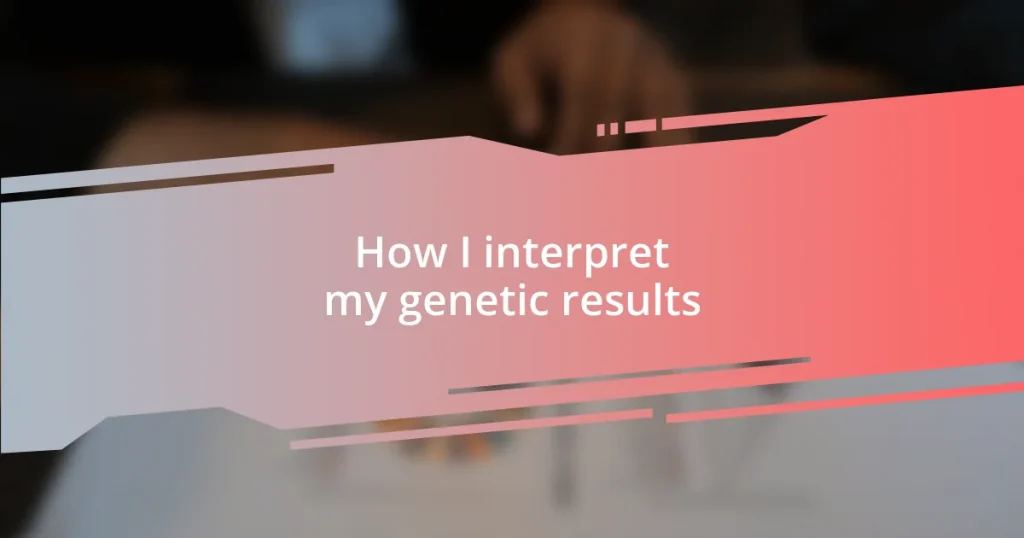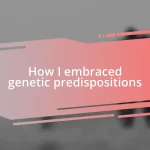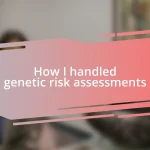Key takeaways:
- Genetic testing serves as a tool for self-discovery, revealing insights about health risks, ancestry, and personal identity.
- Decoding genetic results requires understanding the context and nuances of each finding, emphasizing the importance of professional guidance.
- Applying genetic insights to personal health choices can lead to proactive lifestyle changes, enhancing both physical and emotional well-being.
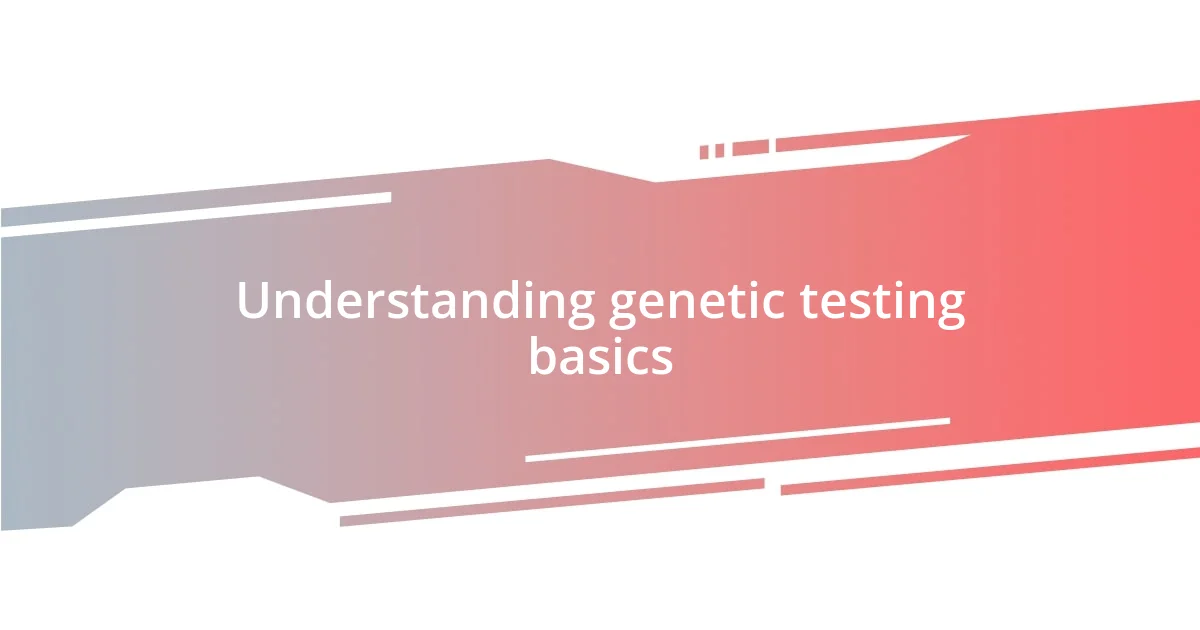
Understanding genetic testing basics
Genetic testing can feel like embarking on a journey of self-discovery, and for me, it was just that. I remember the moment I received my results; it was thrilling yet overwhelming. Have you ever opened a door to a room you weren’t quite ready to enter? That’s how I felt, standing on the brink of newfound knowledge about my genetic makeup.
At its core, genetic testing examines our DNA, the blueprint of our biological identity. I learned that this information can reveal a lot—like potential health risks and traits passed down through generations. It made me wonder, how much of who we are is written in our genes versus shaped by our experiences?
When I digested the basics of genetic testing, I realized it isn’t just about health risks; it’s also about understanding my ancestry and family history. I found joy in tracing my lineage back through the genetic markers. It was like piecing together a puzzle that had been scattered throughout my family tree. What stories do your genes tell?
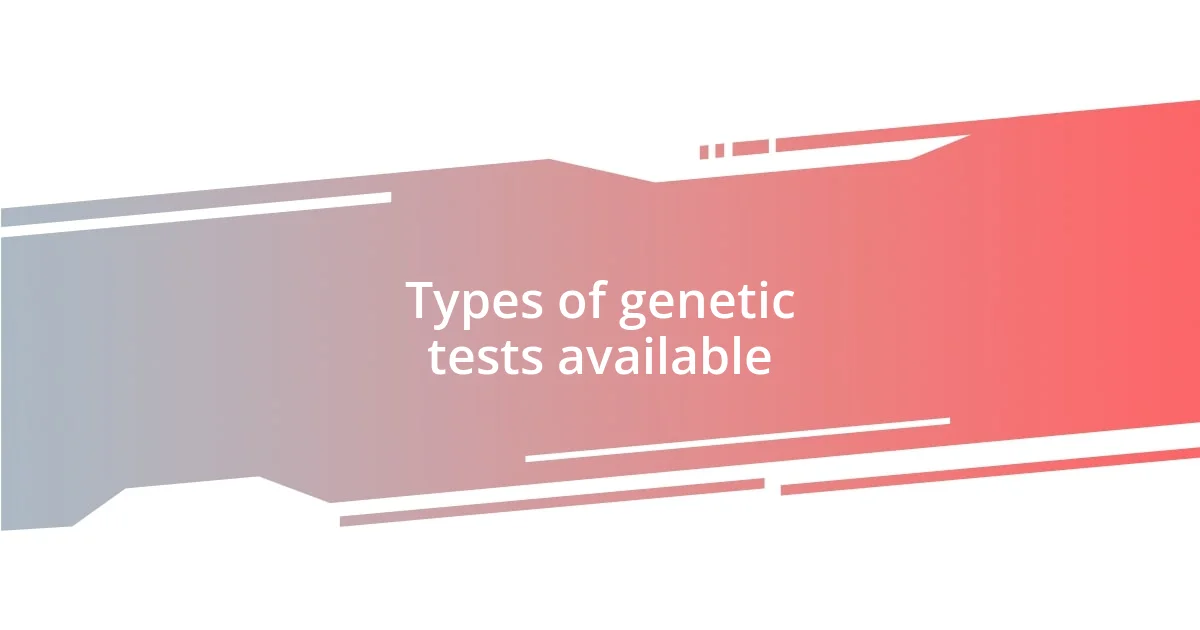
Types of genetic tests available
Once I delved deeper into genetic testing, I discovered a variety of tests that cater to different interests and concerns. Each type serves a unique purpose, whether it’s understanding health predispositions or exploring ancestral roots. I remember feeling a mix of curiosity and apprehension—what insights would these tests unveil about me?
Here are some common types of genetic tests you might encounter:
- Diagnostic Testing: Used to confirm or rule out specific genetic conditions.
- Carrier Testing: Determines if a person carries a gene for a genetic disorder, often relevant for family planning.
- Ancestry Testing: Reveals your ethnic background and origins, connecting you to distant relatives.
- Health Risk Testing: Assesses genetic markers associated with increased risk for certain diseases.
I found each category fascinating, but it was the ancestry aspect that truly captured my heart. Unraveling threads of my family’s past ignited a passion in me—suddenly, stories of generations flowed back to life, and I felt like a time traveler exploring my family’s history through the lens of science.
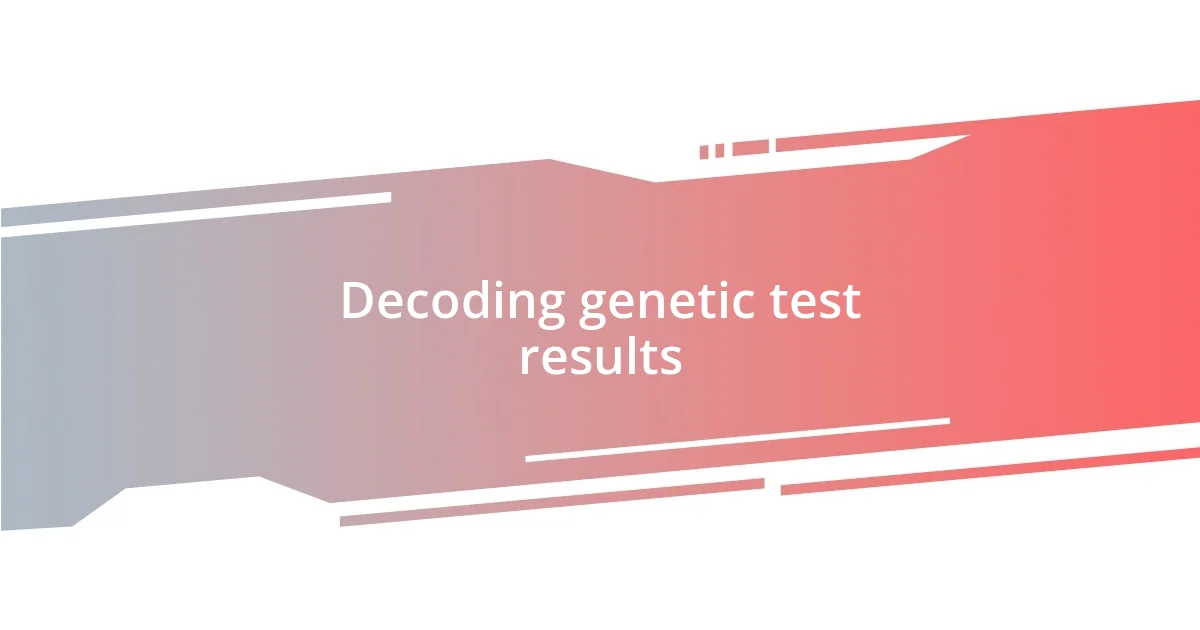
Decoding genetic test results
Decoding genetic test results can feel like deciphering a complex code written just for you. When I first started analyzing my results, it was like standing in front of a giant map filled with dotted lines and symbols that hinted at my identity. One particular finding struck me—my genetic predisposition to certain health conditions. I couldn’t help but feel a mix of concern and revelation. Knowing it wasn’t just numbers on a page made it all the more personal. Have you ever felt that moment when the pieces of your life’s puzzle suddenly come together, even if the picture isn’t exactly what you expected?
As I delved into the specifics of my test results, I realized the importance of context—understanding what each genetic variant truly means. For instance, a risk variant for a particular disease doesn’t guarantee I will develop it; it merely indicates a higher likelihood. This nuance is crucial to grasping one’s genetic makeup. I remember my excitement dwindling at times, confused by the scientific jargon. Breaking it down into bite-sized pieces helped—having a trusted source or professional to guide me made all the difference. How do we take what initially feels like overwhelming data and transform it into actionable insights for our lives?
In exploring my ancestry through these test results, I found relationships I had never expected. For example, I discovered I had a substantial percentage of an ethnicity I had never considered part of my makeup. This revelation ignited a profound sense of belonging and curiosity about my roots. Isn’t it fascinating how our genes can link us to distant relatives we’ve never met? Decoding this layer of my genetic results felt like uncovering hidden treasure—a reminder that our history is intertwined with those who came before us.
| Aspect | My Interpretation |
|---|---|
| Health Risks | Indicates predispositions rather than certainties, requiring a balanced view. |
| Ancestral Connections | Reveals unexpected ties to cultures and histories, enriching my identity. |
| Genetic Variants | Each variant tells a unique story that invites deeper exploration into my health and lineage. |
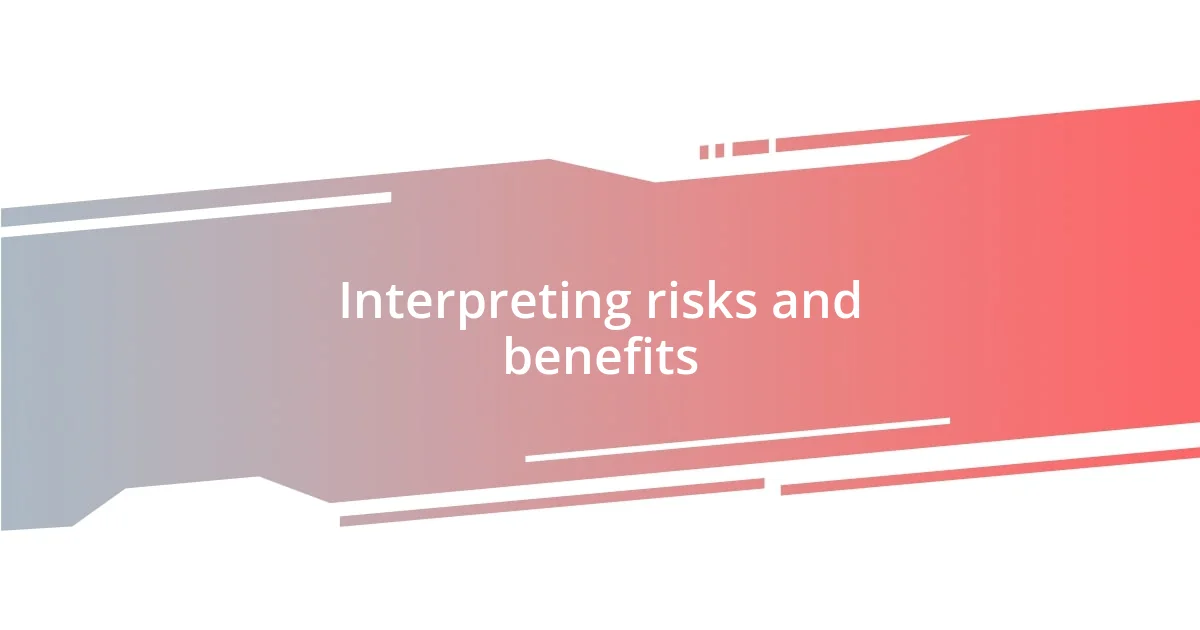
Interpreting risks and benefits
Understanding the risks and benefits of my genetic results was a journey in itself. I remember sitting with my results, feeling both empowered and anxious at the same time. It’s essential to keep in mind that a genetic predisposition doesn’t mean a certain fate; it’s like having a roadmap that highlights areas of potential concern but doesn’t dictate my route. Have you ever stared at a map, only to realize that you have the power to choose which road to take?
One benefit that stood out to me was the ability to monitor my health proactively. When I learned I had a genetic variant linked to a higher risk of diabetes, I could shift my lifestyle habits—more exercise and healthier eating became my new goals. This felt like turning knowledge into action, which was empowering. It’s reassuring to know that with awareness, I can influence my health positively. Have you thought about how understanding your risks could push you toward healthier choices? I certainly have.
However, the emotional weight of interpreting these results can’t be overstated. There were moments I questioned whether I should regret uncovering certain traits. Learning about risks associated with heart disease made me re-evaluate my family history and the patterns I’d seen play out. I often found myself reflecting on my family members and wondering if they wished they had such insights. How would they have changed their choices if they had the chance? Embracing the idea that this knowledge could empower rather than paralyze me was key. There’s a fine line between awareness and anxiety, and I learned to tread it carefully.
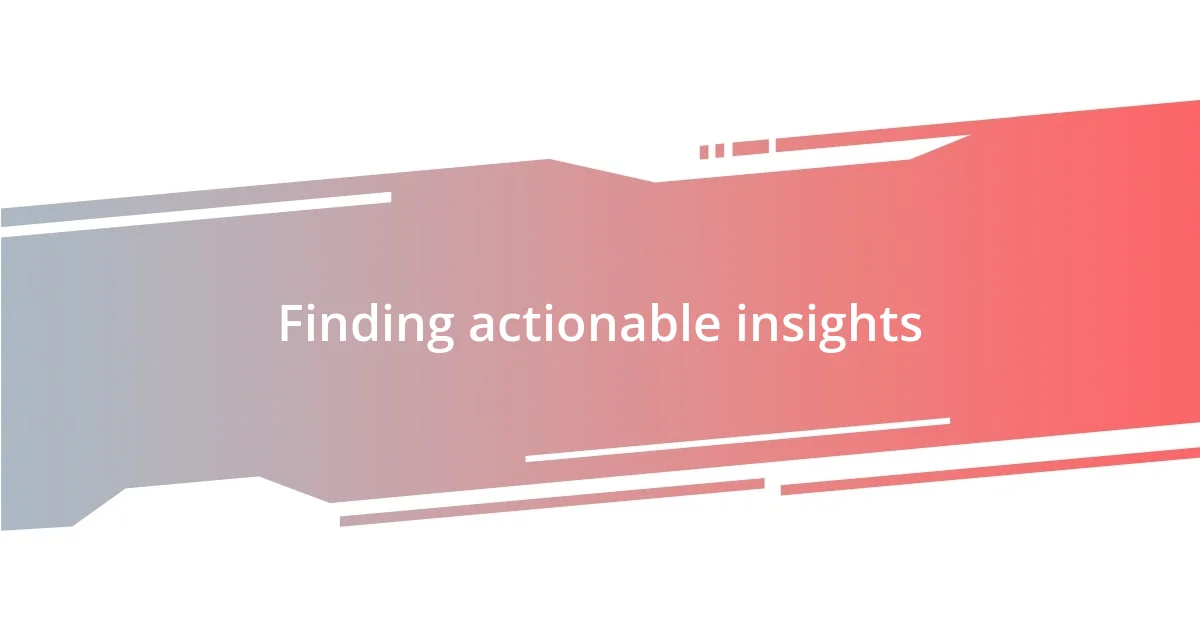
Finding actionable insights
Finding actionable insights in my genetic results felt like unearthing a treasure chest filled with possibilities. Each notable finding prompted me to rethink my daily habits and health choices. For instance, discovering a predisposition to certain cholesterol levels pushed me to have a candid chat with my doctor about diet changes and exercise plans. Have you ever considered how small tweaks today could pave the way for a healthier tomorrow? I can tell you, that revelation changed my approach to wellness.
As I sifted through my results, I stumbled upon some surprising allergens—ones I had never suspected. I remembered one particularly memorable moment when I ate a food that had always brought me joy, only to wake up the next day with an annoying rash. The connection became clearer after my tests. Suddenly, avoiding that food wasn’t just a choice; it became essential for my overall well-being. Isn’t it fascinating how our own genetic blueprint can help us steer clear of problems we didn’t even realize were lurking?
I’ve learned that actionable insights extend beyond health; they empower personal growth too. Given my overall risk factors, I found myself diving into physical fitness with renewed vigor. I set goals for myself and sought out supportive communities, driving a sense of accountability that I hadn’t had before. This was more than just understanding my genetics—it was about taking charge of my life. Don’t you think that understanding our genetic makeup can push us into areas of personal growth we never thought possible? For me, that journey has been invigorating and transformative.
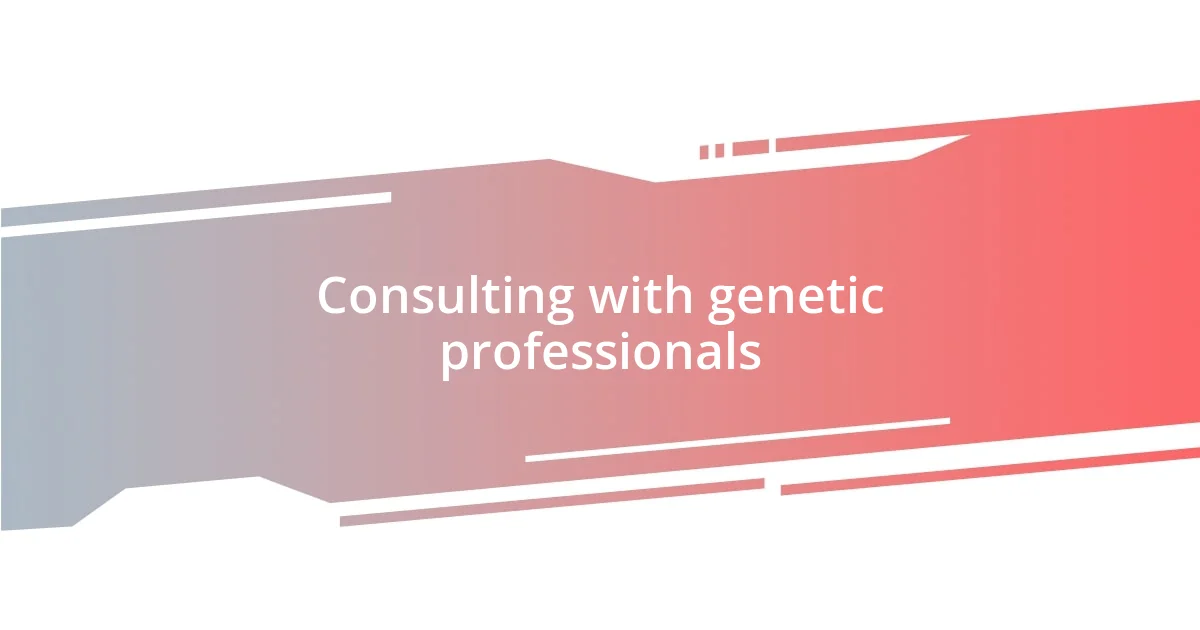
Consulting with genetic professionals
In navigating the complexities of my genetic results, the guidance of genetic professionals became invaluable. I vividly recall my first appointment, sitting in the dimly lit office, the consultant’s calm demeanor easing my initial anxieties. They provided clarity, turning what felt like overwhelming data into understandable insights. Have you ever felt lost in a sea of information? Their expertise helped me see the bigger picture and focus on what truly mattered for my health.
I also learned the importance of asking the right questions during consultations. One memorable exchange was when I inquired about the implications of a specific variant I carried. The genetic counselor broke it down beautifully, explaining not just the risk associated with it but also the steps I could take—simple lifestyle adjustments that could mitigate potential issues. This proactive approach left me feeling empowered. Isn’t it amazing how knowledge can transform fear into action?
The emotional support I received from these professionals was another crucial aspect of the process. After sharing my results, I allowed myself to voice my worries and fears. The counselor listened intently, validating my feelings while gently reframing my perspective. I realized that I wasn’t alone in this journey; having someone who truly understood was a tremendous relief. Have you had someone guide you through an emotional maze? Their support turned what initially felt like a burden into a collaborative exploration of my health possibilities.
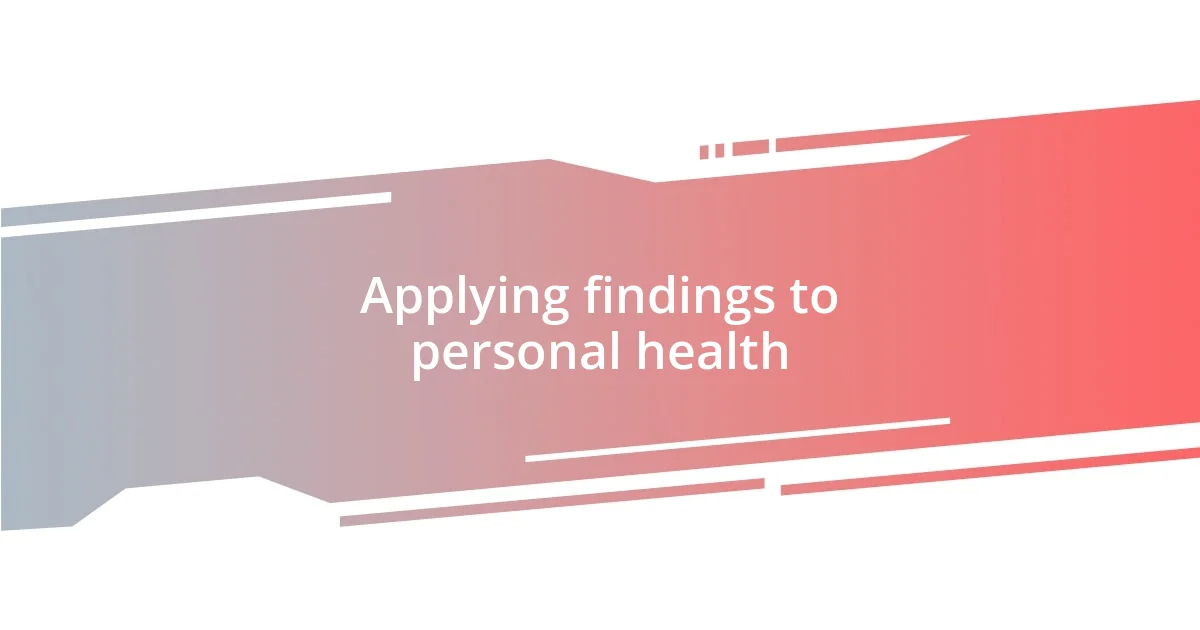
Applying findings to personal health
After I delved into my genetic findings, I found myself questioning the impact of my lifestyle choices in a fresh light. For example, upon discovering a genetic predisposition to high blood pressure, I started tracking my sodium intake more diligently. It was surprising how much sodium was hidden in everyday foods! This sparked a culinary adventure—experimenting with herbs and spices to enhance the flavor of my meals without added salt. Have you ever had such an awakening about your diet? It’s incredible how a little awareness can lead to delicious changes.
Another revelation came when I learned about my body’s unique response to certain exercises. I remember the day I realized my genetics favored endurance over strength training—suddenly, my twice-weekly attempt at heavy lifting seemed misguided. Instead, I shifted my routine toward running and cycling, which felt far more natural and invigorating. It was a game-changer. Can you imagine finally discovering the workout that truly energizes you? Understanding these nuances has made me feel more connected to my body.
Emotional well-being also took center stage after I processed my results. Initially, I was anxious about potential genetic risks, but I gradually embraced the idea that knowledge is power. I began practicing mindfulness and meditation, recognizing that stress could exacerbate any genetic vulnerabilities in my health. I’ve found these practices not only enhanced my emotional resilience but also made me more aware of how my mental state influences my physical health. Isn’t it intriguing how the mind and body are so interconnected? Reflecting on this journey, I realize that applying my genetic insights has not only improved my physical health but cultivated a deeper sense of self-awareness and harmony in my life.










